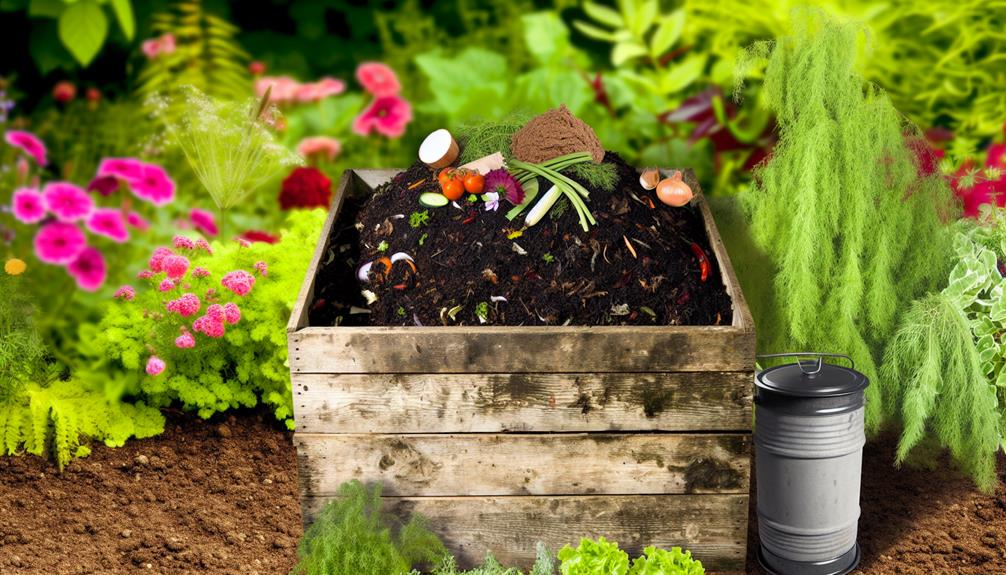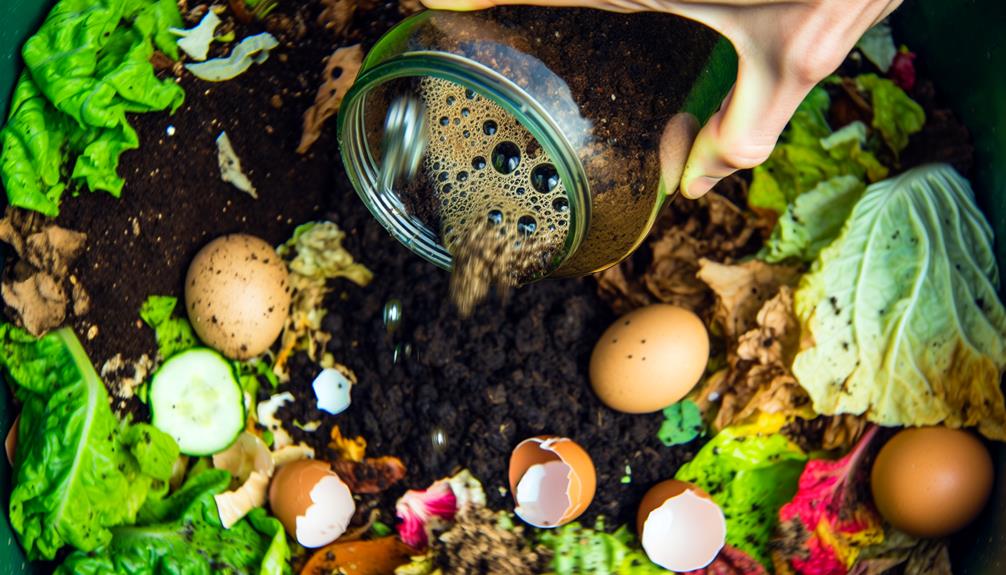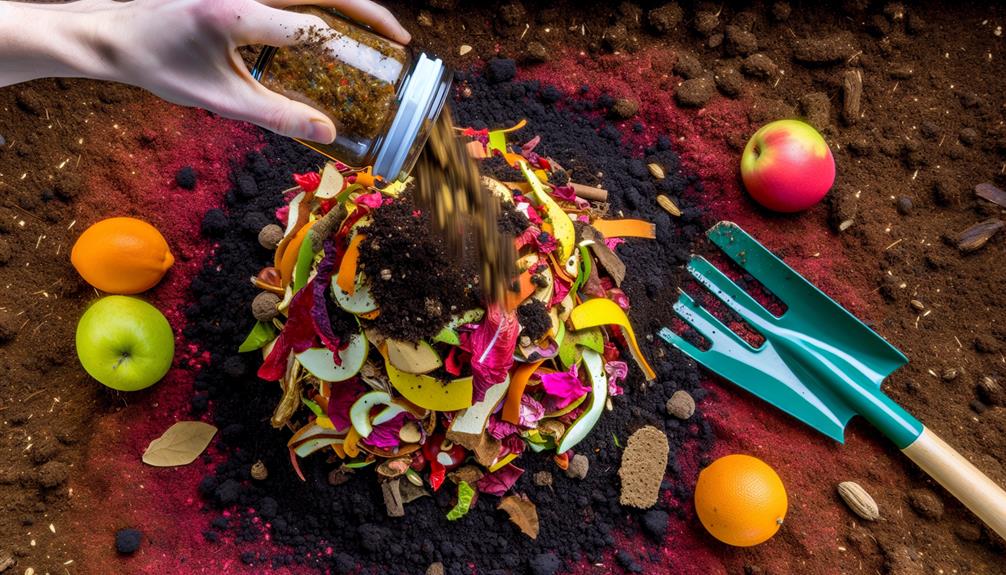

You can compost sourdough starter to enrich your soil and promote sustainability. It’s packed with nutrients that benefit your compost pile. Add small amounts gradually and mix it with dry materials to maintain balance. The high moisture and acidity can disrupt the pile if added excessively, so it’s important to manage quantities.
Regularly turning the compost pile guarantees efficient decomposition. Additionally, sourdough starter can be sticky, so be sure to break it up to avoid clumping. If you want to discover more effective tips and alternative uses, there’s more information you won’t want to miss.
Understanding sourdough starter begins with recognizing it as a living culture of wild yeast and bacteria. When you cultivate a sourdough starter, you’re nurturing a community of microorganisms that thrive through the fermentation process.
This process is what gives sourdough its unique tang and complexity. By maintaining a balance of flour and water, you create an environment where these wild yeasts and bacteria can flourish.
To keep your sourdough starter healthy, you need to manage its hydration levels. Hydration levels refer to the ratio of water to flour in your starter. A 100% hydration starter means equal parts water and flour by weight. Adjusting these levels can affect the fermentation process, influencing the texture and flavor of your bread.
For a community-minded baker like you, understanding these basics helps you join a broader network of sourdough enthusiasts who share tips and experiences.
Regular feeding of your starter ensures it stays active and vibrant. You’ll typically discard a portion of the starter before adding fresh flour and water. This discard can accumulate, leading you to wonder how to manage it sustainably, such as through composting.
Managing your sourdough starter discard sustainably by composting offers numerous benefits for both your garden and the environment. One of the primary advantages is nutrient enrichment. When you add sourdough starter to your compost pile, it breaks down and releases valuable nutrients that plants need to grow strong and healthy. These include essential elements like nitrogen, phosphorus, and potassium, which are crucial for plant development.
Composting also contributes to soil revitalization. Over time, soil can become depleted of nutrients, especially if you garden frequently. By incorporating compost into your soil, you’re replenishing these lost nutrients, creating a richer, more fertile growing medium. This improved soil structure enhances water retention, reduces erosion, and promotes healthier root systems for your plants.
Furthermore, composting helps reduce waste. Instead of discarding your sourdough starter and other organic materials into the trash, where they’d contribute to landfill mass and methane emissions, you’re turning waste into a valuable resource. By composting, you’re not only helping your garden thrive but also contributing to a more sustainable environment.
Joining a community of composters also fosters a sense of belonging. You’re part of a movement that values sustainability and environmental stewardship.
Also Read: Can You Compost Blood?
Ever wondered how to compost your sourdough starter discard effectively? You’re not alone. Many home bakers face the challenge of disposing of their sourdough discard in a sustainable way.

The good news is, you can compost it! The fermentation process that occurs in your sourdough starter creates a rich environment of microbial activity. These microbes are beneficial for your compost pile.
Start by adding small amounts of sourdough discard to your compost heap. Too much at once can overwhelm the pile, so it’s best to introduce it gradually.
The high moisture content of the discard helps keep the compost moist, which is essential for microbial activity. Make sure you mix the discard thoroughly with other compost materials like leaves, grass clippings, and vegetable scraps.
This helps maintain a balanced carbon-to-nitrogen ratio, critical for efficient composting.
While composting sourdough starter discard has its benefits, there are also some potential drawbacks to take into account. One concern is the fermentation process. When you add sourdough starter to your compost, the active fermentation can continue, potentially disrupting the balance of your compost pile. This might lead to an overgrowth of wild yeast and bacteria, which could alter the microbial ecosystem essential for effective composting.
Another issue to ponder is the high acidity of sourdough starter. The fermentation process produces lactic acid, which can lower the pH of your compost pile. This acidic environment may not be ideal for all composting microorganisms, potentially slowing down the decomposition process and affecting the overall quality of your compost.
Additionally, the sticky nature of sourdough starter can make it clump together, creating pockets that mightn’t break down as efficiently. These clumps can become anaerobic, leading to unpleasant odors and a less efficient composting process.
To manage these potential drawbacks, you need to carefully monitor your compost pile and consider it remains balanced. This involves mixing your sourdough starter discard well with other compost materials and maintaining proper aeration and moisture levels.
Also Read: Can You Compost Cabbage?
When composting your sourdough starter, balance green and brown materials to guarantee effective decomposition. Greens, like kitchen scraps and fresh grass clippings, provide nitrogen, while browns, such as dried leaves and cardboard, offer carbon.

Avoid common pitfalls like adding too much moisture or neglecting to turn the pile, which can lead to odor and slow breakdown.
To create an efficient compost pile, mix green materials like fruit scraps and grass clippings with brown materials such as dried leaves and cardboard. This balance ensures your compost has the right carbon ratio and nitrogen balance, essential for breaking down materials effectively.
Greens, rich in nitrogen, provide the necessary nutrients for microorganisms that decompose organic matter. On the other hand, browns, high in carbon, offer structure and help control moisture levels. Aim for a ratio of roughly 2:1 browns to greens for best decomposition.
When adding your sourdough starter, treat it as a green material due to its moisture and nutrient content. Layer it with dry leaves or shredded paper to maintain balance.
Making sure your compost thrives involves steering clear of common mistakes that can hinder decomposition. Effective composting, especially with ingredients like sourdough starter, requires attention to detail to support the fermentation process and maintain healthy microbial activity.
First, avoid adding too much moisture. Overly wet compost can drown the microbes, slowing down decomposition. Balance your wet (green) and dry (brown) materials carefully.
Don’t overload with greens: Too many nitrogen-rich materials can create a slimy, smelly pile.
Shun large chunks: Large pieces of food waste or yard debris take longer to break down. Chop or shred materials to speed up the process.
Watch the temperature: Compost that’s too cold or too hot can disrupt microbial activity. Aim for a consistent temperature between 135-160°F.
Next, ensure good aeration. Compost needs oxygen for microbial activity to thrive. Regularly turning your pile will help.
Lastly, be cautious about what you add. Avoid items like meat, dairy, and oily foods, as they can attract pests and create odors.
Also Read: Can You Compost Body Wash?
Don’t toss that extra sourdough starter; it can transform into delicious pancakes, waffles, and even crackers.
For pancake recipes, simply add a cup of starter to your usual mix for a tangy twist. The natural yeast in the starter gives your pancakes a delightful fluffiness and unique flavor.
If you’re a fan of homemade pizza, try incorporating your starter into pizza dough. The starter not only enhances the dough’s texture but also adds a depth of taste that store-bought dough can’t match.
Beyond breakfast and dinner, you can also create savory crackers. Mix the starter with some flour, olive oil, and your favorite herbs. Roll it out thin, cut into shapes, and bake until crispy. These homemade crackers are perfect for cheese platters or as a snack.
Another creative use is in baked goods like sourdough banana bread or muffins. The starter adds a moist, tender crumb and a slight tanginess that complements the sweetness of the fruit.
Yes, sourdough starter can attract pests to your compost pile, but you can practice pest prevention by using compost barriers. This way, you’ll keep your compost healthy while staying connected to eco-friendly practices.
You’ll find the decomposition rate for sourdough starter depends on microbial activity in your compost. Typically, it takes a few weeks to break down completely, but be patient and trust the process – your compost community’s got this!
Yes, you should dilute sourdough starter before adding it to compost. Aim for a 50/50 dilution ratio with water to balance the water content and help it integrate smoothly, ensuring your compost community thrives.
Yes, adding sourdough starter can affect the pH balance of compost. It may increase soil acidity, but compost microbes usually adjust over time. You’re contributing to a balanced ecosystem, so don’t worry too much.
When composting sourdough starter with mold, consider the mold varieties. Some might pose health hazards. You’re part of a community that values safety, so it’s best to avoid composting moldy starter to prevent risks.
To sum up, you can compost your sourdough starter effectively by following some simple guidelines.
Make sure it’s mixed well with other compost materials to balance its high moisture content.
Be mindful of any potential drawbacks, such as attracting pests.
With proper management, your sourdough starter can contribute valuable nutrients to your compost.
Alternatively, consider using excess starter in recipes or as a plant fertilizer.
Utilize these tips to make the most of your sourdough starter.
